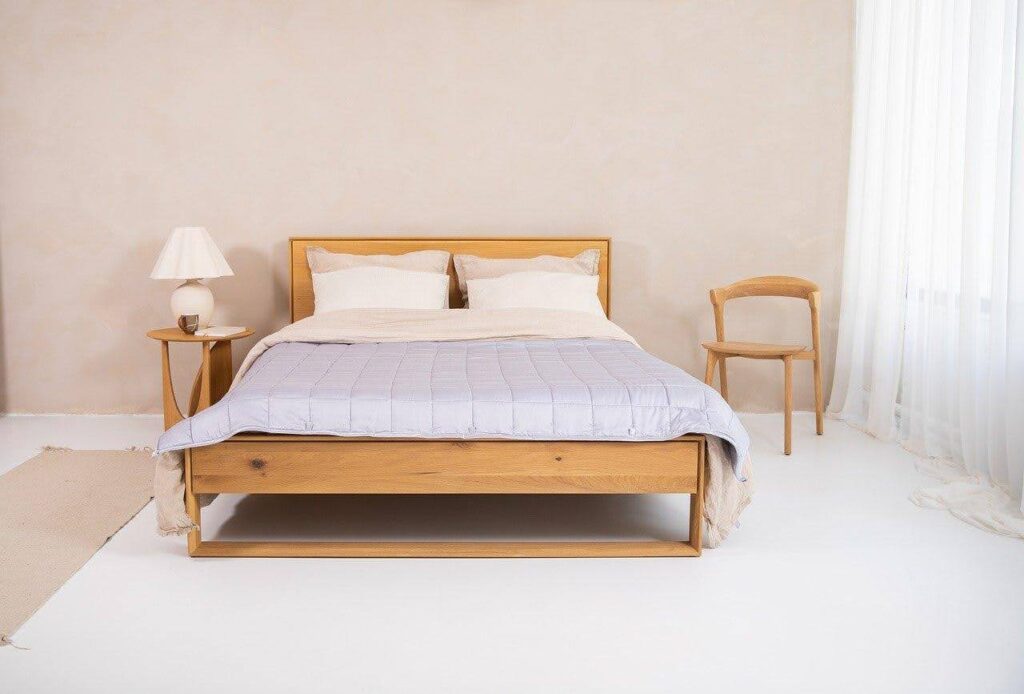How to Create a More Sustainable and Natural Bedroom
Creating a sustainable and natural bedroom is not just about design–it’s a commitment to harmony, health, and the well-being of our environment. Imagine drifting off to sleep surrounded by bedding sourced from nature, knowing that your bedroom is as much of a haven for rest as it is a friend to the planet. A few simple changes are all it takes to transform your space into a more sustainable getaway filled with natural, non-toxic furniture and goodies. Join us as we explore options to transform your sleep space into a cozy, earth-friendly oasis.
Natural Bedroom 101
Let’s rewind for a second: what is a sustainable bedroom, anyway? A sustainable and natural bedroom is a harmonious retreat where every element, from the bedding to the furniture, is chosen with consideration for the environment and human health. In this space, you’ll find natural materials like organic cotton, bamboo, reclaimed wood, and natural latex, all these are ideally ethically and responsibly sourced. Overall, avoiding harmful chemicals and minimizing environmental impact is a key part of a sustainable bedroom setup.
The journey towards a sustainable bedroom is about making thoughtful choices over time and doesn’t require an immediate overhaul. Replacing items gradually with sustainable alternatives is a more realistic, budget-friendly approach.
Is a Minimalist Bedroom Considered Sustainable?
Minimalism and sustainability often go hand in hand. Both ideas emphasize simplicity, functionality, and mindful consumption.
Most minimalist bedrooms prioritize natural fibers and organic materials over synthetic and mass-produced products. These materials boast minimal environmental impact and promote healthier air quality with reduced off-gassing of harmful chemicals often found in conventional products.
A minimalist bedroom also promotes mental well-being. A visually clutter-free space cultivates tranquility, promoting relaxation and sleep quality. By choosing fewer long-lasting, high-quality pieces, we simplify our space and reduce the need for frequent replacements – we all know that the never-ending need for consumption that cheaper products create is stress-inducing itself!
Sustainable Bedroom Brands
When you’re ready to start transforming your space into something more sustainable, it helps to know where to look. Several brands are leading the charge in making bedrooms more eco-friendly and less toxic by prioritizing sustainable materials and ethical practices. From bedding to furniture, these companies offer alternatives prioritizing human health and environmental well-being:
- Coyuchi: Known for its organic bedding and bath linens made from GOTS-certified organic cotton.
- Cozy Earth: Experts in viscose made from bamboo textiles; Expect luscious pajamas, sheets, pillow cases and even mattress toppers manufactured in ethical facilities.
- Avocado: Specializes in eco-friendly mattresses made with natural and organic materials, including GOLS-certified latex and GOTS-certified cotton.
- Saatva: Offers modern furniture designs crafted from sustainable materials such as high-quality hardwood and natural fabrics like linen and velvet.
- The Citizenry: Sources artisan-made bedding, rugs, and decor using sustainable materials and fair trade practices.
Non Toxic Pillows and Pillow Cases
Pillows are crucial for quality sleep and overall well-being. Also, pillows are in close contact with our skin and airways for extended periods, making choosing non-toxic materials all the more important.
Fortunately, you don’t have to look too hard to find great sustainable options. Our favorite non-toxic pillows provide essential head, neck, and spine support, promoting proper alignment and reducing discomfort.
We prioritize pillows made from natural, organic materials such as GOTS-certified organic cotton and OEKO-TEX-certified latex, free from harmful chemicals and allergens for a sleep environment that is not only comfortable but also safe and eco-friendly.
Which Natural Bedding Materials Are Right For You?
From organic cotton to bamboo and linen, natural materials boast breathability, moisture-wicking properties, and hypoallergenic benefits. They are gentle on the skin, which promotes better sleep and overall comfort. Also, natural fibers are biodegradable and renewable. That means your items won’t sit in a landfill for generations after you finish using them.
With that said, let’s take a look at some of the best natural bedding materials for the sustainable shopper.
Wool Bedding
Wool bedding is comfortable, warm, and sustainable. It is all-natural and derived from sheep fleece, which is exceptionally breathable.
Key Benefits:
- Wool fibers’ moisture-wicking power helps regulate body temperature and keeps you dry and comfortable while you sleep.
- Wool is naturally hypoallergenic and resistant to microorganisms, making it a great choice for people with allergies or sensitivities.
- It is also inherently fire-resistant, providing an added safety layer without chemical treatments.
Where to Find Wool Bedding:
Our favorite wool pillows include eco-friendly and gentle-on-the-skin brands like Frankenmuth and Lifekind. Pair these pillows with our favorite soft and washable wool pillow cases from Woolroom or myWoolly.
Shleep and HomeofWool’s wool sheets are versatile and sustainable, and Avocado and Savvy Rest’s wool comforters offer natural insulation and temperature regulation.
Eucalyptus Bedding
Eucalyptus bedding, known for its luxurious feel and sustainability, is derived from the pulp of eucalyptus trees. It offers enhanced airflow and moisture-wicking properties, ensuring a fresher sleep space.
Key Benefits:
- Eucalyptus fibers regulate body temperature, providing comfort in all seasons, and are hypoallergenic, ideal for sensitive skin.
- Eucalyptus trees are fast-growing and require minimal water and pesticides, making this bedding environmentally friendly.
Where to Find Eucalyptus Bedding:
Our top picks include Buffy’s eucalyptus sheets and comforters, made from 100% eucalyptus fibers sourced from renewable forests, hypoallergenic, cruelty-free, and OEKO-TEX certified. Sheets & Giggles and Sijo’s eucalyptus pillows and pillowcases are among our favorites for their softness, durability, and moisture-wicking power.
Cotton Bedding
Cotton bedding, a longtime favorite for its comfort, durability, and versatility, is sourced from the fluffy fibers of the cotton plant.
Key Benefits:
- Cotton offers breathability and moisture absorption for a cool, dry sleep.
- Its softness makes it gentle on the skin, while its durability allows for frequent laundering without losing shape.
- Cotton bedding can be customized with various styles and colors to fit any taste and bedroom decor.
Where to Find Cotton Bedding:
Our top picks for sustainable cotton bedding include Boll & Branch’s 100% organic cotton pillows, pillowcases, and sheets sourced from fair-trade certified farms.
Parachute’s cotton pillowcases, sheets, and duvet covers are made from Egyptian cotton, which is known for its superior softness and durability.
Brooklinen’s cotton comforters and bedding essentials are OEKO-TEX certified and available in various thread counts and designs.
Linen Bedding
Linen bedding, known for its elegance, durability, and breathability, is crafted from the fibers of the flax plant.
Key Benefits:
- Linen’s durability makes it a long-lasting investment, with strong fibers resistant to wear and tear.
- Its breathability, like cotton, ensures a cool, dry sleep, while its softness improves with each wash.
- Linen’s natural texture and subtle wrinkles create a casual yet elegant look that works in modern or traditional spaces.
Where to Find Linen Bedding:
Our top picks for sustainable linen bedding include Avocado and Sijo’s 100-percent organic linen sheets, Quince and Casaluna’s soft, breathable linen pillowcases, and Cozy Earth’s lightweight yet warm linen comforters.
Hemp Bedding
Hemp bedding is gaining popularity for its sustainability, durability as well as hypoallergenic properties. It is eco-friendly since it’s derived from hemp plant fibers, which are less impactful on the planet than many other materials.
Key Benefits:
- Hemp is very breathable and moisture-wicking, helping regulate body temperature and promoting comfortable sleep.
- Hemp is a fast-growing and highly renewable crop that requires minimal water, pesticides, and synthetic fertilizers and absorbs significant atmospheric carbon dioxide.
- Hemp fibers are known for their strength and resilience, making hemp bedding incredibly durable and long-lasting.
- Hemp bedding is also naturally hypoallergenic; its antimicrobial properties help prevent the growth of harmful microorganisms.
Where to Find Hemp Bedding:
Our top picks for hemp bedding include Crate & Barrel and Buffy for soft, chemical-free hemp pillowcases, Avocado and Ettitude for cozy hemp comforters, Delilah and Buffy for quality hemp sheets, and Pilō and Solera Sleep for soft and supportive hemp pillows.
Sustainable Mattress Toppers
With your bedding preferences established, you can shift your attention to other parts of your space. Want to really take your natural bedroom to the next level? Invest in a sustainable matter topper made with non-toxic and familiar materials you can trust.
Most sustainable mattress toppers prioritize comfort and breathability, with organic cotton and bamboo offering softness and moisture-wicking properties, keeping you cool and dry.
Many use wool to provide natural insulation and temperature regulation, while latex offers excellent support and pressure relief. These materials are hypoallergenic and resist mold, dust mites, and mildew, which makes them ideal for allergies or sensitivities.
Our favorite mattress protectors and toppers include Avocado and Birch for organic mattress toppers, PlushBeds and Woolroom for wool mattress toppers, and Cozy Earth and Panda London for bamboo mattress toppers. They make these mattress toppers with top-quality natural materials, ensuring superior comfort and protection while meeting strict environmental and safety standards.
Natural Mattresses
Natural mattresses are also becoming more popular thanks to their focus on health and well-being. Conventional mattresses often emit harmful chemicals, contributing to indoor air pollution and health issues.
In contrast, natural mattresses are crafted from organic and sustainable materials, free from synthetic additives and chemical flame retardants, with certifications such as Global Organic Textile Standards (GOTS) and Global Organic Latex Standard (GOLS) for a safer and healthier sleep environment.
Natural mattresses also offer superior comfort and support. At the same time, materials like organic cotton, wool, and latex provide insulation, temperature regulation, pressure relief, and durability.
Natural Bedroom Decor
Incorporating sustainable materials like organic cotton, linen, wool, and bamboo in your bedroom decor reduces waste and minimizes environmental impact compared to chemical-laden synthetic options.
Natural bedroom decor promotes mental and emotional well-being by creating a serene space for relaxation and rejuvenation. Our top picks, from the best non-toxic bed frames to our favorite linen throw pillows and coziest eco-friendly blankets, are made from natural materials to support your cultivation of a natural and sustainable bedroom.
Final Words on Your Sustainably-Minded Bedroom
By incorporating natural materials, eco-friendly practices as well as conscious choices into our sleep environment, we prioritize our well-being and contribute to the planet’s health.
In my shift toward more natural and sustainably-minded bedrooms for my young family, I’ve made small changes to improve indoor air quality while maintaining cozy comfort by switching to latex mattresses and 100% cotton bedding. These natural materials, free from harmful chemicals and toxins that off-gas, promote sleep quality with their softness, comfort, and breathability.
Remember, sustainability is a journey, not a destination. Go at your own pace and do what works best for you. Whether making small changes or taking larger strides toward sustainability, every step counts toward creating a bedroom that embodies harmony, health, and eco-consciousness.
Photo by Gilberto Peralta Bocio on Unsplash


